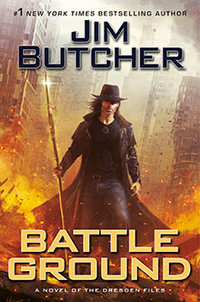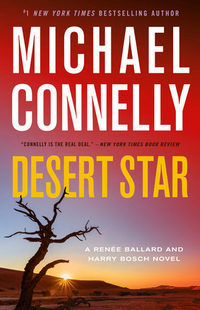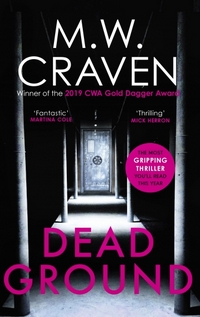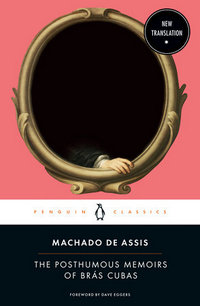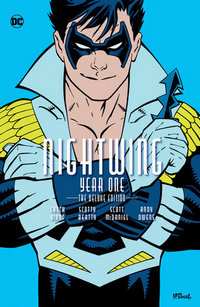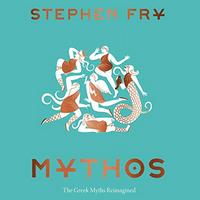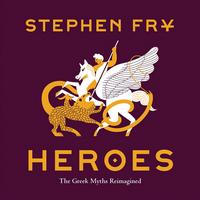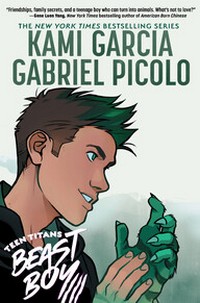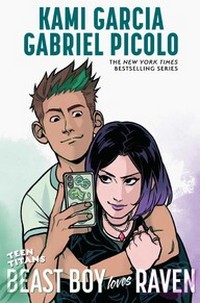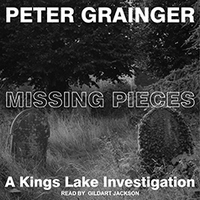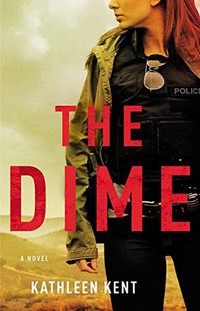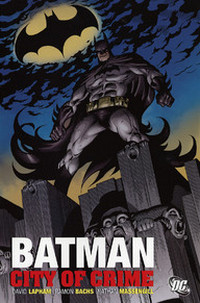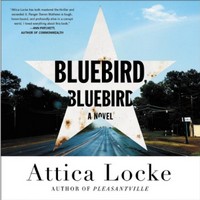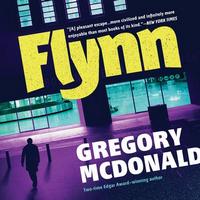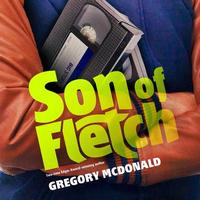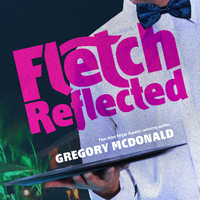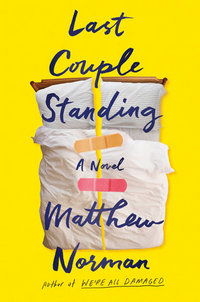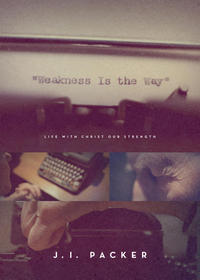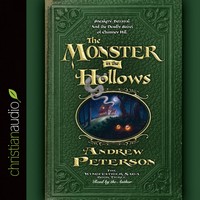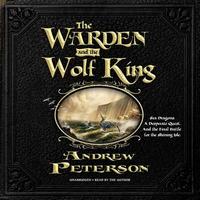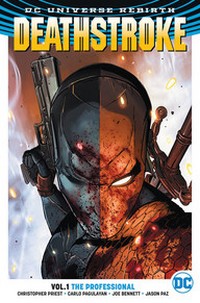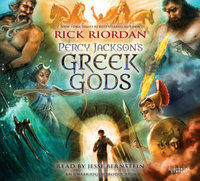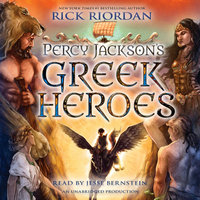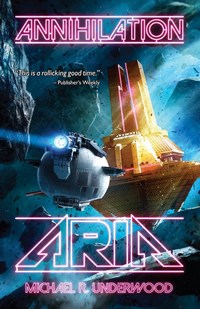I can’t tell you when this became a (largely) annual thing for me to post, but it was on a blog that pre-existed this one. As always, seems like a good day to post it.
Category: M-R Page 1 of 10
Series M-R

I did this last month to catch up up to 2023, but the backlog I’d accrued last year was too big for me. So here we go again. This doesn’t get me totally cuaght up, but it’s close enough. Hopefully it’ll be years before I have to resort to this again.
I frequently mention how looming Mt. TBR is getting for me, but what’s worse is my “To Write About” pile, I know I’m never going to catch up with that properly and it bugs me to no end. But in the interest of something being better than nothing, a dash of realism, and a heavy dose of self-care, I’m cutting myself some slack. This was painful to do, I was looking forward to writing about most of these, and I have so much that I want to say. But I’m just not going to get to them—and other books are starting to pile up, too. So, in 144 characters or less, here’s me cutting myself some slack.
(Click on the cover for an official site with more info)
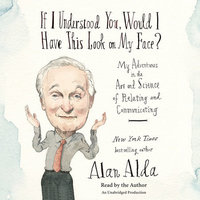  |
If I Understood You, Would I Have This Look on My Face?: My Adventures in the Art and Science of Relating and Communicating by Alan Alda Not sure how helpful this was–but it was quite entertaining & interesting. Hours of Alda’s narration–it almost doesn’t matter what he said. |
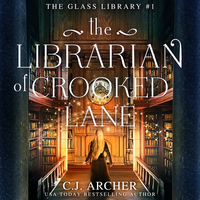  |
The Librarian of Crooked Lane by C.J. Archer, read by: Marian Hussey Great idea. Okay (ish) execution. Had to push myself to keep going more than once. |
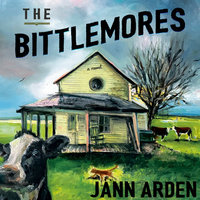  |
The Bittlemores by Jann Arden So strange at times. The ending made all of the “why am I bothering” parts worth it. Capital Q-quirky and emotionally effective. Give it a try. |
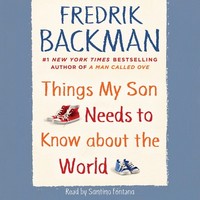  |
Things My Son Needs to Know about the World by Fredrik Backman, read by: Santino Fontana Hilarious and touching. Backman seems more down-to-earth than expected–a great writer & a relatable dad. Should give this to my grandkid’s dad. |
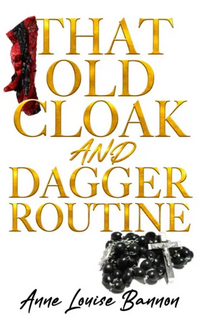  |
That Old Cloak and Dagger Routine by Anne Louise Bannon Ummm…a cozy and fairly self-consciously chaste spy novel. Who knew that was possible? Wasn’t wowed, but intrigued enough to read more. |
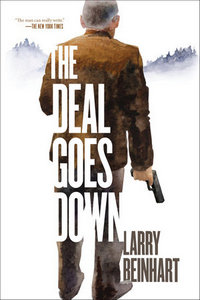  |
The Deal Goes Down by Larry Beinhart A compelling, self-aware, action read. Really dug it, but not sure I’m 100% into the story’s wrap-up, but the denouement helped. |
  |
Endangered by C.J.Box, read by: David Chandler Ehhhh…I liked this, I think. I’m not sure what to say about it (hence the months of silence from me, I guess) |
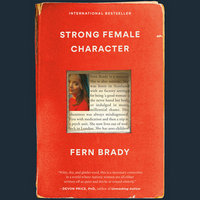  |
Strong Female Character by Fern Brady Funny and helpful look at one woman coming to terms with an ASD diagnosis, and how she got to it. |
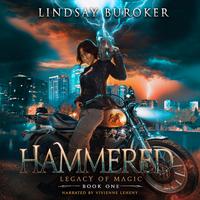  |
Hammered by Lindsay Buroker, read by: Vivienne Leheny Good world, great protagonist/narrator. Decent introductory novel. I’ll be back for more. |
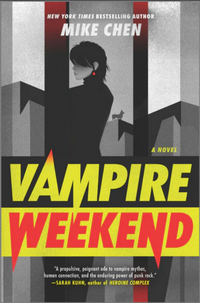  |
Vampire Weekend by Mike Chen Heckuva read. Words have failed me for a year with this one. The premise, execution, characters, plot–all typical Chen greatness. |
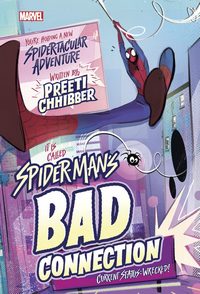  |
Spider-Man’s Bad Connection by Preeti Chhibber Not as good as book 1, but filled with everything I liked about it. Seemed more concerned about setting up the series arc than this book’s plot. |
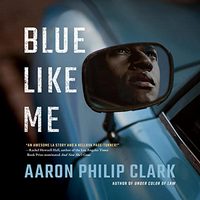  |
Blue Like Me by Aaron Philip Clark, read by: Preston Butler III The mystery/police aspect of this series is great. The personal life material is less so. This author/narrator combo makes it worthwhile. |
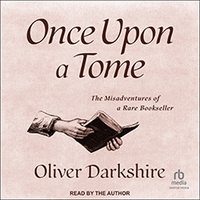  |
Once Upon a Tome: The Misadventures of a Rare Bookseller by Oliver Darkshire If you’ve ever wondered what it’s like to work in an antiquarian bookshop or if you like quietly charming people talk about unusual occupations… |
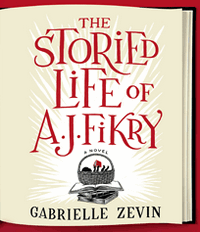  |
The Storied Life of A.J. Fikry by Gabrielle Zevin, read by: Scott Brick So sweet, so heartwarming, so charming. This novel about booksellers in love–and Firkney’s adorable daughter–will steal your heart. |
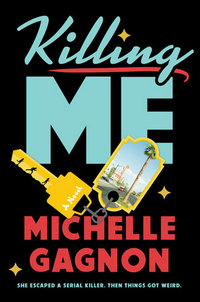  |
Killing Me by Michelle Gagnon Great take on vigilante serial killers. Great turns and twists. |
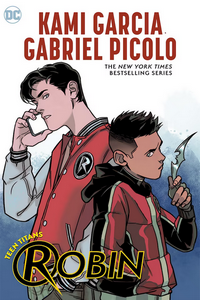  |
Teen Titans: Robin by Kami Garcia, Art by: Gabriel Picolo Not the best in the series, but Garcia’s take on these characters is good enough to overcome that. I just wish these came out faster. |
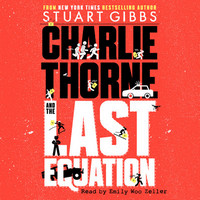  |
Charlie Thorne and the Last Equation by Stuart Gibbs, read by: Emily Woo Zeller The problem with an impossibly smart characters is that the creators behind them aren’t that smart. The results are disappointing. |
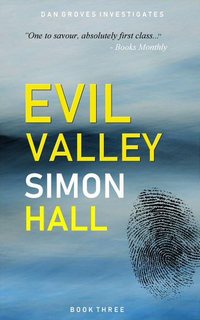  |
Evil Valley by Simon Hall I like this series, I like the characters…didn’t think this was up to the author’s standards. Some great scenes and a compelling killer. |
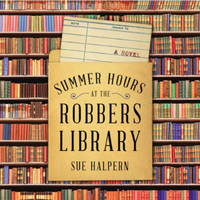  |
Summer Hours at the Robbers Library by Sue Halpern, read by: Josh Bloomberg, Dara Rosenberg, Allyson Ryan Meandering. The major reveal was a major letdown. It was just intriguing enough to keep me listening, but I wish it hadn’t been. |
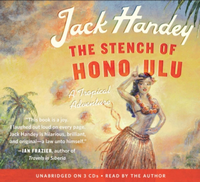  |
The Stench of Honolulu: A Tropical Adventure by Jack Handey What a waste of time (mine and the authors) and talent. |
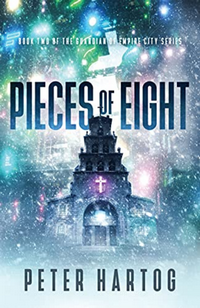  |
Pieces of Eight by Peter Hartog I <3 this universe. I think this case was weaker, but the character moments, growth, and magic were so great that it didn't matter. I need more. |
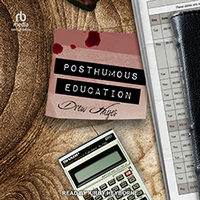  |
Posthumous Education by Drew Hayes, read by: Kirby Heyborne Good to be back in Fred’s world. Not the best collection of episodes for the Vampire Accountant, but pleasant enough. |
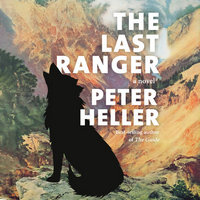  |
The Last Ranger by Peter Heller, read by: Mark Deakins Feels like a CJ Box standalone that he abandoned because he couldn’t come up with an ending. Heller couldn’t either, but called it good anyway. |
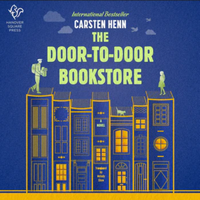  |
The Door-to-Door Bookstore by Carsten Henn, read by: Raphael Corkhill, translated by Melody Shaw Schmaltzy but pure-of-heart. One central character’s motivation makes no sense. Ignoring that, it’s a sweet celebration of books/readers. |
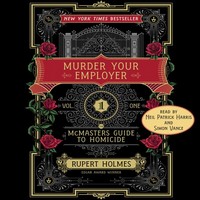  |
Murder Your Employer: The McMasters Guide to Homicide by Rupert Holmes, read by: Simon Vance, Neil Patrick Harris Possibly too clever for its own good. I vacillated between reveling in it and utter disdain. It’s a mixed-bag that won me over in the end. |
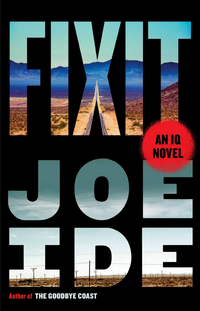  |
Fixit by Joe Ide IQ and Dodson are back and better than ever. Who needs to say more than that? |
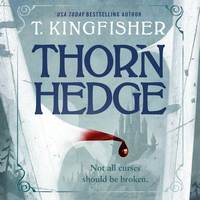  |
Thornhedge by T. Kingfisher, read by: Jennifer Blom Great prose in service of a solid modern take on Cinderella. |
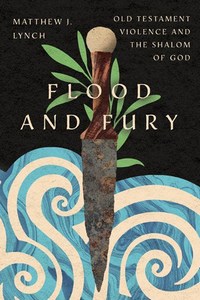  |
Flood and Fury: Old Testament Violence and the Shalom of God by Matthew J. Lynch Helpful work on Divine Violence (how to think of it, how not to think of it or avoid the idea, either) and about the conquest of Canaan. |
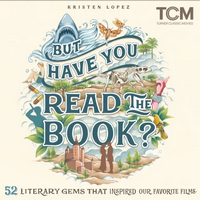  |
But Have You Read the Book?: 52 Literary Gems That Inspired Our Favorite Films by Kristen Lopez How can a book with this premise be so dull? And snobbish, too. |
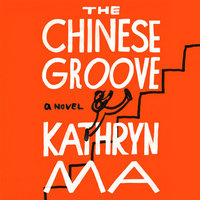 
| The Chinese Groove by Kathryn Ma, read by: James Chen Great characters, an okay story, but the payoff wasn’t there. The ending was bad enough to make me wish I hadn’t spent the time. |
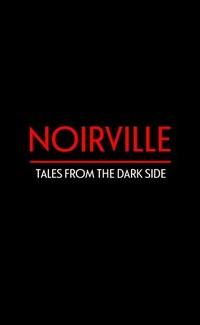  |
Noirville: Tales From The Dark Side by Chris McVeigh 15 of the best short stories I’ve ever read. This is how Crime Fiction should always be. |
  |
Grand Theft Astro by Scott Meyer, read by: Elizabeth Evans The Stainless Steel Rat with a contemporary twist. Meyer is capable of better, but I had enough fun (not sure I’m sold on the ending) |
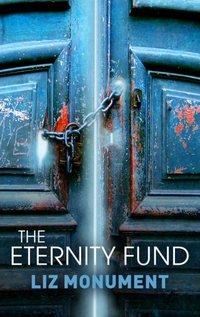  |
The Eternity Fund by Liz Monument Dynamite dystopian adventure. Worth the $ just for the worldbuilding. The story and characters were even better–I’d relish a sequel. |
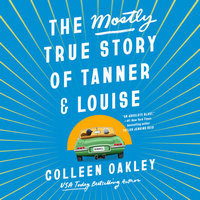  |
The Mostly True Story of Tanner and Louise by Colleen Oakley, read by: Hillary Huber It took me a long time to decide what this book was really about, but I enjoyed the trip. The destination was okay, too. |
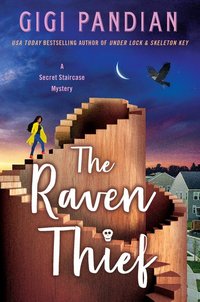  |
The Raven Thief by Gigi Pandian See what I said about Spider-Man’s Bad Connection. |
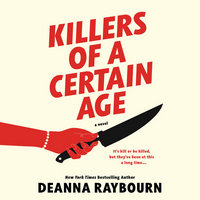  |
Killers of a Certain Age by Deanna Raybourn, read by: Jane Oppenheimer, Christina Delaine Who doesn’t enjoy an octogenarian assassin? Who doesn’t love female assassins? A group of them out for revenge? Sure-fire fun. |
  |
Vanished by Kat Richardson, read by: Mia Brown Good story, but felt underwhelmed by it all. I think it was me and my timing. not Richardson. I need to get back on this horse. |
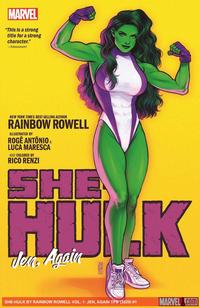  |
She-Hulk, Vol. 1: Jen, Again by Rainbow Rowell A real winner from Rowell. I knew I should’ve started reading this series earlier. Good art, interesting arcs, & some real smiles were induced. |
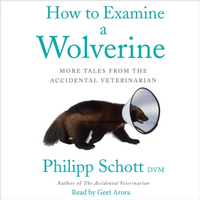  |
How to Examine a Wolverine: More Tales from the Accidental Veterinarian by Philipp Schott, read by: Geet Arora A fun Veterinarian Memoir, with a lot of heart. James Herriot with more laughs and technology. |
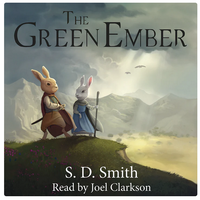  |
The Green Ember by S.D. Smith, read by: Zach Franzen Maybe too much like Wingfeather Saga, but with rabbits instead of humans. Still, a good fantasy for the MG crowd. |
  |
Don’t Hang Up by Benjamin Stevenson, read by: Luke Arnold, Sybilla Budd I can’t do better than Mike Finn did. Go read what he said. It’s why I listened. |
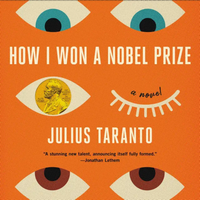  |
How I Won a Nobel Prize by Julius Taranto, read by: Lauren Fortgang Some good writing, but squandered for…I’m not sure really. |
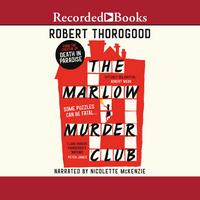  |
The Marlow Murder Club by Robert Thorogood, read by: Nicolette McKenzie Decent cozy with an intriguing cast of oddball slueths. |
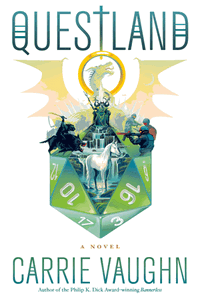  |
Questland by Carrie Vaughn Jurassic Park for RPG, SF, Fantasy, etc. fans. Been a Vaughn fan for years, but don’t know that I’ve had this much fun with one of her novels. |
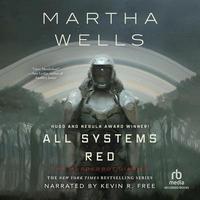  |
All Systems Red by Martha Wells, read by: Kevin R. Free Oh, wow. I understand all the fuss over this series. I shouldn’t have slept on this–or the sequels like I have. |
  |
Self Help by Ben H. Winters, read by: Wil Wheaton, Ron Perlman Cool concept. Great cast. Entertaining but not-entirely satisfying result. Worth the time. But not much more. |
![]()
I did this back in January 2020, and need to do it again.
I frequently mention how looming Mt. TBR is getting for me, but what’s worse is my “To Write About” pile, I know I’m never going to catch up with that properly and it bugs me to no end. But in the interest of something being better than nothing, a dash of realism, and a heavy dose of self-care, I’m cutting myself some slack. So I’m clearing the deck of everything from 2020-2022 that I haven’t made time for. This was painful to do, I was looking forward to writing about most of these, and I have so much that I want to say. But I’m just not going to get to them—and other books are starting to pile up, too. So, in 144 characters or less, here’s me cutting myself some slack.
How bad am I at keeping up with my To-Write-Titles? I put together the list of books for this post in January 2023. And am just now getting to it. I wish that was a joke.
(Click on the cover for an official site with more info)
It’s Election Day in the U.S. tomorrow, so I thought I’d share this little bit from Archie Goodwin to commemorate it.
 The most interesting incident Tuesday morning was my walking to a building on Thirty-fourth Street to enter a booth and push levers on a voting machine. I have never understood why anybody passes up that bargain. It doesn’t cost a cent, and for that couple of minutes, you’re the star of the show, with top billing. It’s the only way that really counts for you to say I’m it, I’m the one that decides what’s going to happen and who’s going to make it happen. It’s the only time I really feel important and know I have a right to. Wonderful. Sometimes the feeling lasts all the way home if somebody doesn’t bump me.
The most interesting incident Tuesday morning was my walking to a building on Thirty-fourth Street to enter a booth and push levers on a voting machine. I have never understood why anybody passes up that bargain. It doesn’t cost a cent, and for that couple of minutes, you’re the star of the show, with top billing. It’s the only way that really counts for you to say I’m it, I’m the one that decides what’s going to happen and who’s going to make it happen. It’s the only time I really feel important and know I have a right to. Wonderful. Sometimes the feeling lasts all the way home if somebody doesn’t bump me.
–Archie Goodwin
from A Family Affair
![]()
My nearly annual tribute to one of my favorite fictional characters (if not my all-time favorite). I’ve got to do an overhaul to this soon, but it is slightly updated and tweaked from two years ago.
 On Oct. 23* in Chillicothe, Ohio**, Archie Goodwin entered this world—no doubt with a smile for the pretty nurses—and American detective literature was never the same. He’s the narrator (and, I’d argue protagonist) of the questionably named Nero Wolfe mysteries. While the eccentric and overweight genius might be what brings people to the series, it’s Archie’s wit, attitude, and snappy narrative voice that brings people back.
On Oct. 23* in Chillicothe, Ohio**, Archie Goodwin entered this world—no doubt with a smile for the pretty nurses—and American detective literature was never the same. He’s the narrator (and, I’d argue protagonist) of the questionably named Nero Wolfe mysteries. While the eccentric and overweight genius might be what brings people to the series, it’s Archie’s wit, attitude, and snappy narrative voice that brings people back.
* About 34 years ago, no matter what year it is that you read this.
** Although, in Too Many Women, we read: “Your father’s name is James Arner Goodwin, and you were born in Canton, Ohio, in nineteen-fourteen. Your mother’s maiden name was Leslie. You have two brothers and two sisters.” Stout claims that the PI who looked into Archie got it wrong.
When my aunt first gave me a Nero Wolfe book to read, she sold me on the Wolfe character, but when I read it, I wasn’t so sure that I liked the guy. But his assistant? He was cool. Sure, it didn’t take me long to get into Wolfe, but Archie’s always been my favorite. Since I was in Middle School, if I was suffering a slump of any kind (reading, emotional, physical), time with Archie Goodwin could get me out of it. There were a few years that when I got sick, I’d grab a Nero Wolfe novel to help me get through it (along with the Vitamin C and Chicken Noodle soup), and you can’t tell me it didn’t work. Noted critic Jacques Barzun says it well:
If he had done nothing more than to create Archie Goodwin, Rex Stout would deserve the gratitude of whatever assessors watch over the prosperity of American literature. For surely Archie is one of the folk heroes in which the modern American temper can see itself transfigured. Archie is the lineal descendant of Huck Finn.
While Archie’s about as far from a teetotaler as you can get, to commemorate his birthday, I’m toasting him in one of the ways I think he’d appreciate most—by raising a glass of milk in his honor.
Who was Archie? Archie summed up his life like this:
Born in Ohio. Public high school, pretty good at geometry and football, graduated with honor but no honors. Went to college two weeks, decided it was childish, came to New York and got a job guarding a pier, shot and killed two men and was fired, was recommended to Nero Wolfe for a chore he wanted done, did it, was offered a full-time job by Mr. Wolfe, took it, still have it.” (Fourth of July Picnic)
Long may he keep it. Just what was he employed by Wolfe to do? In The Black Mountain he answers the statement, “I thought you was a private eye” with:
I don’t like the way you say it, but I am. Also, I am an accountant, an amanuensis, and a cocklebur. Eight to five you never heard the word amanuensis and you never saw a cocklebur.
In The Red Box, he says
I know pretty well what my field is. Aside from my primary function as the thorn in the seat of Wolfe’s chair to keep him from going to sleep and waking up only for meals, I’m chiefly cut out for two things: to jump and grab something before the other guy can get his paws on it, and to collect pieces of the puzzle for Wolfe to work on.
In Too Many Women, he’s a bit more concise and describes himself as the:
heart, liver, lungs and gizzard of the private detective business of Nero Wolfe, Wolfe being merely the brains
In Poison a la Carte (and echoed in Bullet for One and If Death Ever Slept), he describes his job as:
[Wolfe’s] assistant detective and man Friday, Saturday, Sunday, Monday, Tuesday, Wednesday, and Thursday
In Black Orchids, he reacts to an insult:
…her cheap crack about me being a ten-cent Clark Gable, which was ridiculous. He simpers, to begin with, and to end with no one can say I resemble a movie actor, and if they did it would be more apt to be Gary Cooper than Clark Gable.
Over at The Thrilling Detective, he’s described this way:
If Goodwin hadn’t gone to work for Wolfe, he’d certainly have his own agency by now (and temporarily does, in one novel). Far more of a traditional eye, Goodwin is a tough, handsome guy with a photographic memory, a .32 under his well-tailored suit (and sometimes an extra .38 in his overcoat pocket), and a well-developed appreciation for the ladies. And, in the opinion of more than a few cops, officials and stuffed-shirt executives, a mouth that ought to be nailed shut permanently. (Wolfe isn’t immune either–part of Goodwin’s job, as he sees it, is needling the fat man into taking cases, if only to make sure the bills get covered.) He’s not the deductive genius that Wolfe is, but a smart and tenacious op with a good right hook, and a decent and personable man. Most of all, in his narration of the books, he’s a helluva storyteller; it’s his view of the world, and his interaction with Wolfe, that keeps us coming back for each new mystery.
Archie’s Corner at The Wolfe Pack has more details..
I’m not the only Archie fan out there:
- Someone pointed me at this post, The Wit and Wisdom of Archie Goodwin. There’s some really good stuff here that I was tempted to steal, instead, I’ll just point you at it.
- Robert Crais himself when writing an introduction to a Before Midnight reprint, devoted it to paying tribute to Archie—one of the few pieces of anything written that I can say I agree with jot and tittle.
In case you’re wondering if this post was simply an excuse to go through some collections of Archie Goodwin quotations, you wouldn’t be totally wrong…he’s one of the fictional characters I like spending time with most in this world—he’s the literary equivalent of comfort food. So just a couple more great lines I’ve quoted here before:
I would appreciate it if they would call a halt on all their devoted efforts to find a way to abolish war or eliminate disease or run trains with atoms or extend the span of human life to a couple of centuries, and everybody concentrate for a while on how to wake me up in the morning without my resenting it. It may be that a bevy of beautiful maidens in pure silk yellow very sheer gowns, barefooted, singing “Oh, What a Beautiful Morning” and scattering rose petals over me would do the trick, but I’d have to try it.
I looked at the wall clock. It said two minutes to four. I looked at my wrist watch. It said one minute to four. In spite of the discrepancy, it seemed safe to conclude that it would soon be four o’clock.
I shook my head. “You’re flattering me, Inspector. I don’t arouse passions like that. It’s my intellect women like. I inspire them to read good books, but I doubt if I could inspire even Lizzie Borden to murder.”
She turned back to me, graceful as a big cat, and stood there straight and proud, not quite smiling, her warm dark eyes as curious as if she had never seen a man before. I knew damn well I ought to say something, but what? The only thing to say was ‘Will you marry me?’ but that wouldn’t do because the idea of her washing dishes or darning socks was preposterous.
“Indeed,” I said. That was Nero Wolfe’s word, and I never used it except in moments of stress, and it severely annoyed me when I caught myself using it, because when I look in a mirror I prefer to see me as is, with no skin grafted from anybody else’s hide, even Nero Wolfe’s.
If you like Anglo-Saxon, I belched. If you fancy Latin, I eructed. No matter which, I had known that Wolfe and Inspector Cramer would have to put up with it that evening, because that is always a part of my reaction to sauerkraut. I don’t glory in it or go for a record, but neither do I fight it back. I want to be liked just for myself.
When a hippopotamus is peevish it’s a lot of peeve.
Among the kinds of men I have a prejudice against are the ones named Eugene. There’s no use asking me why, because I admit it’s a prejudice. It may be that when I was a in kindergarten out in Ohio a man named Eugene stole candy from me, but if so I have forgotten all about it. For all practical purposes, it is merely one face of my complex character that I do not like men named Eugene.
It was nothing new for Wolfe to take steps, either on his own, or with one or more of the operatives we used, without burdening my mind with it. His stated reason was that I worked better if I thought it all depended on me. His actual reason was that he loved to have a curtain go up revealing him balancing a live seal on his nose.
It helps a lot, with two people as much together as he and I were, if they understand each other. He understood that I was too strong-minded to add another word unless he told me to, and I understood that he was too pigheaded to tell me to.
I always belong wherever I am.
![]()
According to Some Buried Caesar, 85 years ago today, Archie Goodwin—one of my top 5 All-Time Favorite Characters—met the only woman who could keep his attention for more than a few months, Lily Rowan. Lily shows up several times in the Nero Wolfe/Archie Goodwin series and threatens to steal every scene she appears in (and frequently succeeds). Check out this post from Today in Mystery Fiction for the details—one of my favorite scenes, from one of my favorite books in possibly my favorite series—(I think I have 3 or 4 copies of it), so I had to say something.
Besides, it’s not like I have a long list of dates associated with fictional events to commemorate (but I really should work on one).
How they met 85 years ago, when Archie’s only in his mid-30s, is beyond me. But Math was never my strong suit, I’m sure it makes sense, surely Charlie Epps could explain it to me.
Regardless, it’s a great scene—the first of many between the two. Lily will go on to have great scenes with Mr. Wolfe, as well–one of the more memorable happens at a crucial point in In the Best Families where she does something that no one else does in the Wolfe/Archie books.
![]()
With the earlier post about Fer-de-Lance, it seemed like a good day to repost this, too. I apparently sampled a paragraph or two from the Fer-de-Lance write-up I shared earlier, too. Sorry for the repetition.
I received this email in response to my Happy Birthday, Archie! post last week.
Soooooo, each year you post this, each year I say I’m going to start…just put a request in for Fer-de-Lance, the first of the Nero Wolfe books, right?
Thanks for the question! This is a tricky one for me, and one that I’ve thought too long about already. I’m going to write for the person already interested in the series, and not to convince you to read them—this is practical advice only, no incitement.
Short answer: Maybe.
Longer answer (which I’ll still try to keep under control, because I tend to be hard to stop on this subject, and some of this is adapted from other things I’ve written. Also, because if I start fact-checking some of this, I’ll find myself spending hours, even days, on this, so I might make some minor errors)*:
 Rex Stout’s Fer-de-Lance is the first of 40+ books (novels or short story collections) featuring the exploits of private investigator Archie Goodwin (2 parts Huck Finn, 1 part Philip Marlowe) and his eccentric employer, Nero Wolfe (1 part Sherlock Holmes, 1 part Mycroft Holmes)—yes, I am one of those who think that Archie’s the main character in the mis-nomered Nero Wolfe Mysteries. It makes perfect sense to start with Fer-de-Lance and read chronologically. I did it myself a couple of years back for the first time (I’ve been reading these books for about 30 years now, and its odd that it took me so long), and I picked up subtle nuances, little callbacks and references that I’d missed before. There are almost no story or character arcs that go beyond a book (exceptions are noted below), and (most of) those that do, are easy enough to pick up and don’t spoil too much. Yes, there are introductions of new characters, a character death or two, but by and large you can dip in anywhere and not notice.
Rex Stout’s Fer-de-Lance is the first of 40+ books (novels or short story collections) featuring the exploits of private investigator Archie Goodwin (2 parts Huck Finn, 1 part Philip Marlowe) and his eccentric employer, Nero Wolfe (1 part Sherlock Holmes, 1 part Mycroft Holmes)—yes, I am one of those who think that Archie’s the main character in the mis-nomered Nero Wolfe Mysteries. It makes perfect sense to start with Fer-de-Lance and read chronologically. I did it myself a couple of years back for the first time (I’ve been reading these books for about 30 years now, and its odd that it took me so long), and I picked up subtle nuances, little callbacks and references that I’d missed before. There are almost no story or character arcs that go beyond a book (exceptions are noted below), and (most of) those that do, are easy enough to pick up and don’t spoil too much. Yes, there are introductions of new characters, a character death or two, but by and large you can dip in anywhere and not notice.
- Two quick semi-parenthetical notes on the reading this chronologically before I continue.
- Yes, read the short story collections when you come across them in the chronology. Even if you’re not a short fiction reader, do it. There are some utter gems tucked away in those (and I spent too much time ignoring them).
- The short story collection Death Times Three was published posthumously, but I’m pretty sure they were published in magazines, etc. before the last novel, A Family Affair. Read the collection after Please Pass the Guilt and before A Family Affair. A Family Affair works so, so well as a series finale that it should be treated as one whether or not Stout wrote it as one. It’s oft-debated, but I’m convinced that if Stout lived another year, we’d have had another novel. But he didn’t. So, again, A Family Affair should be the last you read—even if you don’t read chronologically.
In reading about Rex Stout/Nero Wolfe (either by fans or professionals), there’s an oft-quoted line from Walter D. Edmonds that you simply cannot avoid seeing, “I shall never forget my excitement on reading Fer-de-Lance, sprung like Athena perfect form the Jovian brow, fresh and new and at the same time with enough plain familiar things in scene and setting to put any reader at his ease.” Aside from Oliver Wendell Holmes’ margin note (“This fellow is the best of them all.”), there’s nothing that sums up Fer-de-Lance better, sprung like Athena indeed.
It really doesn’t matter how many times you’ve read it, but upon re-reading (and probably even initial reading if this isn’t your first encounter with Wolfe and Archie) you can’t help be struck by how much Fer-de-Lance fits the model of a mature Wolfe novel—almost all the elements are there. These characters are introduced in practically their final format—a little tweak here and there over the course of the first few novels will get them in their final form. The addition of a few other characters will be necessary, but the cast of characters is already over 90% complete. In the first chapter alone we already have Wolfe, Archie, Fritz, Theodore, Fred and Saul presented in a manner fully recognizable to the familiar reader. The story follows a fairly typical route (although the identity of the murderer is revealed far earlier than is the norm), and the essential environmental elements are there—the beer, Wolfe’s eccentric schedule, the orchids, a relapse, the food, a cocky scheme to land a client, an outrageous stratagem for getting that last essential piece of evidence (not that Wolfe needs it to solve the crime, merely to prove he was correct)—the only thing missing is the gathering of the witnesses/suspects/clients for Wolfe to reveal everything in his characteristically dramatic fashion. One recurring thought I had while reading it the last time was that Fer-de-Lance could just as easily have been the fifteenth installment in the series as the first.
If you didn’t understand half of what I wrote above because you’re new to the corpus, well, you’ll get it soon enough. There’s a formula of sorts to Wolfe/Archie novels—violated all the time, despite what we purists like to think, these variations on the theme are some of our favorite moments. You’ll pick the formula up quickly, and find it as comfortable as Wolfe’s nigh-inviolable daily schedule.
So while there is glacial development, the order is almost negligible. I do endorse and suggest a chronological read—but it’s not essential. In fact, I typically recommend The Golden Spiders (#22) or Before Midnight (#25) to newbies before plunging into Fer-de-Lance, they’re among my favorites, and are pretty representative of the fully-developed Wolfe/Archie. A&E used The Golden Spiders as the pilot to their recent series, so I’m not alone in thinking it serves as a good introduction. If you like them in their final form, you’ll have an easier time appreciating Wolfe/Archie in their almost-final form in the early books. Think of the development of Bugs Bunny over the first few shorts as a rough analogue.
Therefore, if your library/used bookstore isn’t sufficiently stocked to do the chronological read, you shouldn’t avoid the series and can dip in wherever you can. It’s like old episodes of Law & Order that you come across on cable. But there are a few things you should read in a certain order for full understanding/emotional impact, and a few others you should read after you’ve acclimated to the world/series a bit, you’ll enjoy/appreciate them more than if they’re in the first five:
- The Doorbell Rang (#41)
- Too Many Women (#12)—a lot of people think Archie comes off like a cad here, it’s never bothered me, however. Still, if you already like him, you’ll forgive him this.
- And Be a Villain (#13), The Second Confession (#15), and In the Best Families (#17)—just seeing the numbers now, surprises me—I’d have thought these were in the 30’s. If Stout had been planning out a 40+ book series, he’d have put them later. Not only should you read them with experience in the series, these three need to be read in this order. There is an omnibus edition in many libraries with these three called Triple Zeck.
- The Black Mountain (#24) would be best read after Over My Dead Body (#7), and after you’re acclimated to the world.
A couple of other suggestions:
- Some Buried Caesar (#6)—should be read early (but not first) and often.
- A Right to Die (#40) should be read only after Too Many Cooks (#5), it’s one of the only times that a non-regular character shows up again. There’s some racially-tinged language in Too Many Cooks that Archie’d grow out of almost immediately. Remember it was originally published in 1938 and cut him a little slack—mostly, be happy that he grows out of it.
- And again, A Family Affair should be read pretty much when there’s nothing left.
Granted, these are all only suggestions. But ones made by a passionate fan. Still, at the end of the day, just read these books, you’ll enjoy them.
Maybe sometime I’ll get into the official continuations by Robert Goldsborough in a post like this.
* Okay, I lied—I pulled up the goodreads page for the series so I could get the numbers on them just to help. But that’s it.
84 years ago today, Archie Goodwin—one of my top 5 All-Time Favorite Characters — met the only woman who could keep his attention for more than a few months, Lily Rowan. Lily shows up several times in the series and threatens to steal every scene she appears in (and frequently succeeds). Check out this post from Today in Mystery Fiction for the details—one of my favorite scenes, from one of my favorite books in possibly my favorite series—(I think I have 3 or 4 copies of it), so I had to say something.
Besides, it’s not like I have a long list of dates associated with fictional events (but really should work on one).
How they met 84 years ago, when Archie’s only in his mid-30’s, is beyond me. But Math was never my strong suit, I’m sure it makes sense, surely Charlie Epps (or Larry or Amita) could explain it to me.
I can’t tell you when this became a (largely) annual thing for me to post, but it was on a blog that pre-existed this one. As always, seems like a good day to post it.
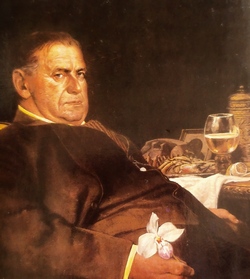 A man condemning the income tax because of the annoyance it gives him or the expense it puts him to is merely a dog baring its teeth, and he forfeits the privileges of civilized discourse. But it is permissible to criticize it on other and impersonal grounds. A government, like an individual, spends money for any or all of three reasons: because it needs to, because it wants to, or simply because it has it to spend. The last is much the shabbiest. It is arguable, if not manifest, that a substantial proportion of this great spring flood of billions pouring into the Treasury will in effect get spent for that last shabby reason.
A man condemning the income tax because of the annoyance it gives him or the expense it puts him to is merely a dog baring its teeth, and he forfeits the privileges of civilized discourse. But it is permissible to criticize it on other and impersonal grounds. A government, like an individual, spends money for any or all of three reasons: because it needs to, because it wants to, or simply because it has it to spend. The last is much the shabbiest. It is arguable, if not manifest, that a substantial proportion of this great spring flood of billions pouring into the Treasury will in effect get spent for that last shabby reason.
–Nero Wolfe
from And Be a Villain
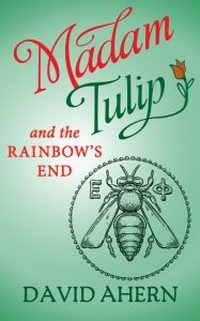 Madam Tulip and the Rainbow’s End
Madam Tulip and the Rainbow’s End
by David Ahern
DETAILS: Series: Madam Tulip, #5 Publisher: Malin Press Publication Date: March 1, 2022 Format: eARC Length: 274 pgs. Read Date: March 5-8, 2022

Yeah, okay, the post title is pretty lame. It’s the best I can come up with. Let’s move past that, okay?
What’s Madam Tulip and the Rainbow’s End About?
Thanks to a series of events that probably rings true for many struggling actors, Derry and Bruce find themselves stranded by the touring company they’d been a part of without funds and a pretty hefty hotel/bar tab. One thing leads to another, and Derry finds herself suiting up as Madam Tulip to do some fortune-telling at a charity event to work off this debt.
She’s happy to do that for a few reasons—it seems that Derry’s trying to cut back on her Tulip work, and really only does it for charities anymore. This time, she can do it for her own benefit and a charity, so she’s okay with that.
As she’s wont to do, as Madam Tulip she befriends a couple of women—one local, and one fellow American (who turns out to employ the local woman). Both women have recently had family members die, and are still grieving. The local woman comes to Madam Tulip for confirmation of her suspicion that her brother was murdered—which Tulip gave her without realizing it. The other woman’s father was supposed to leave her a large amount of money, but didn’t—her focus isn’t on the money as much as it is on understanding what happened (which makes it so much easier to like her).
Having confirmation of her brother’s murder, Mary Jo sets out to prove it and find the murderer—Derry’s friend, Bruce, is going to prove more useful than his psychic bestie on this front and is happy to try. Being able to look at things more objectively, Derry’s able to suggest a thing or two to Lena that might help her find the closure she needs.
Given the nature of a cozy mystery novel, obviously, it won’t be long until Derry finds herself more caught up in the efforts of both women to get the answers they seek—and a little more peril than any three of them expected.*
* Although by this point, Derry should know better—even without any psychic abilities..
Derry’s Gift
Derry’s abilities that stem from being the daughter of a seventh son of a seventh son have gotten her into (and out of) plenty of trouble in the past few books—but they’re never enough by themselves. Derry’s got to figure things out and take advantage of the information she gains—and frequently needs an assist from Bruce for those things that those abilities can’t cover.
This time out, she doesn’t get to take advantage of that gift too much—there are a couple of tarot readings that help her friends (and maybe some of the other readings she does in between those, but we don’t see them). But that’s pretty much it—the rest comes from Derry putting on her metaphorical deerstalker and sussing things out for herself (talking things over with Bruce helps, too).
I think I like it better this way—Derry’s never used her psychic (or whatever) capabilities as a crutch to get to the bottom of things. But the further she gets from that, the better for me.
(although, I can’t imagine I’d complain too loudly if Book 6 or 7 has Derry acting more like Jean Grey/Professor X than Jessica Fletcher)
Jacko Off-the-Grid
You can’t have a Madam Tulip novel without Derry’s father, Jacko, turning up to make things interesting. This time, fresh off a new variety of financial woes (for him, anyway), he decides to rent out his home and go live on an isolated island for a while—to reconnect with his art and avoid the distractions of technology and the city.
Neither Derry nor her mother have a lot of faith that this is going to work too well. But Derry wants to give him the chance and refuses when her mother tries to enlist her to stop him.
In the end, Jacko’s storyline brushes up against Derry’s in a few places, but in more of a “what a small world” kind of way. The two barely interact with each other, and Jacko’s never part of the main action. This is a good use of the character, who is prone to taking over the books (in an entertaining way, but a bit too dominant). Here he gets to go full-on with his antics without impacting the main story—that’s perfect.
So, what did I think about Madam Tulip and the Rainbow’s End?
At this point, getting a Madam Tulip book is a chance to spend time with some friends—with all the warmth, comfort, and pleasantness that comparison brings to mind. Ahern’s got his world and characters down pat now, and the novel moves like clockwork.
This isn’t the same old-same old by any means, however. As he mentioned in our Q&A about this book, Derry not only has to solve a crime this time but there’s a puzzle, too.
Madam Tulip and the Rainbow’s End gives you everything you want in a cozy mystery—good characters, a grin or two, a clever mystery or two, a well-constructed story, and a diverting read for a couple of hours. As expected from this series/author, I’m glad to recommend it to you.
I know Madam Tulip #6 is on the way, and I’m looking forward to it—and hopefully, several more before people in Ireland figure out that they need to stop inviting the fortune teller to their events if they want things to go smoothly (especially nefarious things).
Disclaimer: I received this eARC from the author in exchange for this post. I thank him for that, but the opinions expressed are mine.

![]()


